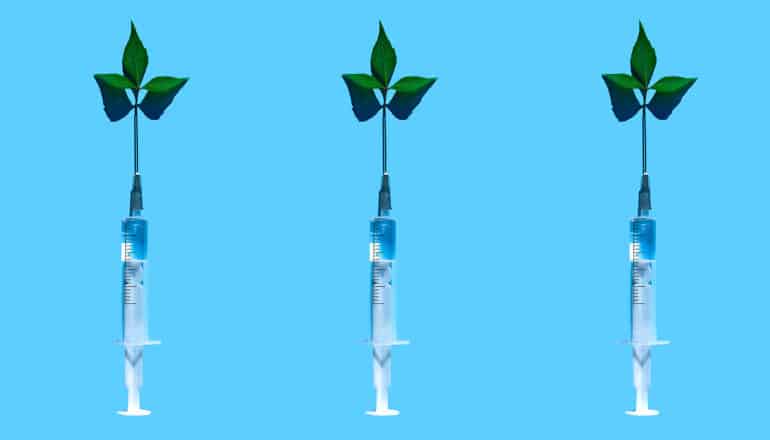
New research shows consumers strongly prefer “natural,” not synthetic, products to prevent ailments. Could this apply to a future COVID-19 vaccine?
“Vaccines are technically a treatment to prevent an ailment,” says Sydney Scott, assistant professor of marketing at Olin Business School at Washington University in St. Louis. “Moreover, vaccines are unnatural insofar as humans create and alter them. Some people refuse vaccines as a preventative measure, preferring not to ‘interfere with nature.'”
As the world anxiously awaits a COVID-19 vaccine, however, perhaps consumers will view it as a curative for a societal problem, Scott says.
“Our research suggests that if consumers view a vaccine more like a curative to the epidemic, rather than as a preventative for the self, they will be more receptive toward it.”
Scott, an expert in consumer behavior and decision-making, is lead author of an article in the Journal of Consumer Research.
‘Natural’ products
Consumers believe that natural products are safer and less potent than synthetic alternatives, the research finds. And they care more about safety and less about potency when they’re trying to prevent problems.
“This research sheds light on when the marketing of ‘natural’ is most appealing to consumers,” Scott says.
Consumers often prefer natural versions of foods, medicines, personal-care products, and home products, according to the paper. “Natural” isn’t a legally defined and regulated term, but consumers’ definition is that a product has no additives and that humans haven’t tampered with it.
“This preference for natural is an increasingly important driver of consumers’ decisions,” Scott says.
In some cases, however, consumers abandon their preference for natural. For example, people widely accept insulin, antibiotics, cortisone creams, and synthetic stain removers, although they are evidently unnatural, according to the paper. “Thus, anecdotally, the preference for natural products looms larger in some situations than in others.”
Consumer preference tests
The researchers focused on the relation between consumers’ judgments about naturalness and their beliefs about two important attributes—safety and potency. They examined when consumers prefer natural most strongly and why the variance in preference for natural occurs.
“Consumers widely desire natural products, but not always to the same degree,” Scott says.
Scott and coauthors Paul Rozin and Deborah Small, both at the University of Pennsylvania, presented seven studies. The results of one show that consumers more strongly prefer the exact same natural product when preventing an ailment than when curing it. Results of another show consumers search for and choose natural products to prevent versus treat cold symptoms.
Another, which examined consumers’ reports about their health choices over a year, indicates consumers prioritize naturalness in their preventative treatments more than in their curative treatments. And another showed that when consumers believed natural products were riskier and more potent than synthetic products, they preferred natural products for curing.
How does this apply to a COVID-19 vaccine?
The research was developed with a focus on individuals making decisions for themselves among multiple treatment options (some natural, some synthetic). But the emergence of the COVID-19 pandemic raises important questions about the implications—and future directions—of their research.
For instance, the authors asked, do pandemics induce a macro-level version of a curative mindset?
“In other words, society may conclude that there already exists a problem—a widespread ailment—that needs to be cured, thereby placing more importance on potency relative to safety,” they write.
Relatedly, consumer acceptance of a prevention for pandemics and epidemics might be affected by the: contagiousness of a disease, severity of a disease, scarcity of treatment options, and novelty of and lack of knowledge about the threat. And each might have downstream consequences on safety/potency tradeoffs consumers are willing to make.
“Our research suggests that, all else equal, natural products are most popular when they are used for preventative purposes,” write the authors.
Source: Jill Young Miller for Washington University in St. Louis
The post ‘Natural’ product bias may apply to COVID vaccine appeared first on Futurity.
from Futurity https://ift.tt/3bYM0RT
No comments:
Post a Comment